Albstadt
Albstadt (German pronunciation: [ˈalpʃtat] ⓘ) is the largest city in the district of Zollernalbkreis in Baden-Württemberg, Germany. It is located on the Swabian Jura mountains, about halfway between Stuttgart and Lake Constance.
Albstadt | |
|---|---|
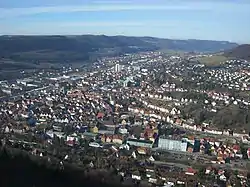 A view of Ebingen. | |
 Coat of arms | |
Location of Albstadt within Zollernalbkreis district 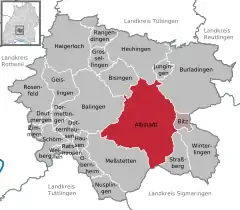 | |
 Albstadt 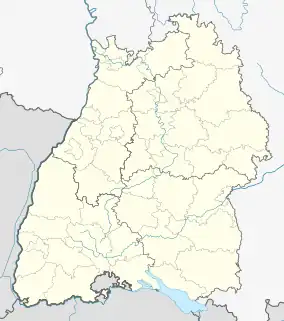 Albstadt | |
| Coordinates: 48°12′43″N 09°01′26″E | |
| Country | Germany |
| State | Baden-Württemberg |
| Admin. region | Tübingen |
| District | Zollernalbkreis |
| Government | |
| • Lord mayor (2023–31) | Roland Tralmer[1] (FW) |
| Area | |
| • Total | 134.41 km2 (51.90 sq mi) |
| Elevation | 731 m (2,398 ft) |
| Population (2021-12-31)[2] | |
| • Total | 45,737 |
| • Density | 340/km2 (880/sq mi) |
| Time zone | UTC+01:00 (CET) |
| • Summer (DST) | UTC+02:00 (CEST) |
| Postal codes | 72421–72461 |
| Dialling codes | 07431, 07432, 07435 |
| Vehicle registration | BL |
| Website | www.albstadt.de |
Geography
Albstadt is spread across a variety of hills and valleys, its elevation ranges between 614 m (2,014 ft) above sea level and 966 m (3,169 ft). One valley is the river Schmiecha, a left-hand tributary of the Danube, a second valley is the river of upper Eyach, a tributary of the Neckar.
To Albstadt belongs also the Raichberg hill in the north, on which there is the Raichberg Transmitter and an observation tower located. South of Albstadt is the Heuberg Military Training Area.
History
Settlement in the region dates back to at least the Iron Age. A Hallstatt cemetery in Albstadt was excavated by amateur archaeologists in the late nineteenth century and revealed a wide range of pottery and metal artefacts. Known as the 'Degerfeld Barrow' cemetery, a substantial collection was built up by the local antiquary Hyronimus Edelmann that was eventually deposited in the British Museum.[3][4]
On November 16, 1911, Albstadt was hit by a Ms 6.1 earthquake, particularly affecting the areas of Tailfingen, Lautlingen and Margrethausen. There was high property damage, but there were no fatalities. Thousands of buildings, including landmarks, were damaged, some of them irreparably. The earthquake also resulted in landslides, which caused additional property damage. It is the second most powerful earthquake recorded in Germany, after the 1756 Düren earthquake.[5][6]
On May 28, 1943, Albstadt was hit by a Ms 5.6 earthquake, again affecting the areas of Tailfingen, Lautlingen and Margrethausen. There was again high property damage on thousands of buildings, but there were no fatalities.[7]
During World War II, a heavy bombing raid was carried out on Albstadt on July 11, 1944, which killed 65 people[8] and another one on February 20, 1945, which killed 19 people.[9] In April 1945, the French moved in, and Albstadt, as part of the newly created state of Württemberg-Hohenzollern, was subsequently part of their occupation zone until 1949.
On September 3, 1978, Albstadt was hit by a Ms 5.7 earthquake (de), which caused high property damage but no fatalities. 6850 buildings were damaged, some of them irreparably. The cost of the damage amounted to 275 million Deutsche Mark, which is the costliest earthquake in Germany to date.[10][11]
Religion
The following religions are present in Albstadt:
- Roman Catholic Church
- YMCA Tailfingen[12]
- Evangelische Landeskirche in Württemberg
- New Apostolic Church in Tailfingen
- Gospel Forum in Ebingen
- Pauluskirche, United Methodist Church parish in Ebingen
- Versammlung of the Brüderbewegung in the Johanneskirche, John Nelson DarbyTailfingen
- Gemeinschaftsstunde Süddeutsche Gemeinschaft, Liebenzell Mission, Evangelischer Gnadauer Gemeinschaftsverband not allowed in the protestant church in Truchtelfingen and Tailfingen
- Russian Orthodox Church in Tailfingen Schlossstaße Tailfingen. Servie in Balingen Siechenkirche and Meßstetten Lamprechtskirche[13]
- TOS[14]
- Gemeinde Gottes[15]
- Adventisten [16]
Economy and Infrastructure
Most of the textiles industry (among them Hasana J. Hakenmüller) is gone today, leaving some monuments, like Villa Haux. However, one of the world's biggest makers of industrial needles, Groz-Beckert, is still based in the town. Other prominent local companies include Mey (knitwear), Mettler Toledo (weighing systems) and a major part of Assa Abloy security systems (Eff-Eff Brand). Ebingen also hosts the technical and computer science faculties of Albstadt-Sigmaringen University with about 3,000 students (2014).
Education
Albstadt presides over its own modern school system, with elementary through high school provided all within the same city, including Kindergartens and boarding schools for the mentally and physically challenged. Also, the city library offers free internet access to residents.
University
The university was founded in 1971 and has two campus locations, Albstadt and Sigmaringen. [17]
Sport School
In Baden Württemberg training of a sports team or athlete, called Übungsleiter C, is in Tailfingen,Landessportschule Langenwand.As well a hotel with 120 beds. Coach (sport) [18]
Mining
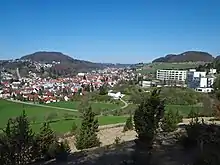
In former times iron ore was produced in Albstadt. Fidel Eppler was the name of the mine-inspector. The buttress wood was bought in Truchtelfingen and used from Lautlinger Knappen at the Hörnle area .[19] From an old 3,5 km mine in a Doggererzflöz in Weilheim is wood in the Tuttlinger Fruchtkasten .[20] Steel was produced in Tuttlingen by the Schwäbische Hüttenwerke in Ludwigstal, today iron brakes.
Districts
The districts Ebingen, Laufen, Lautlingen, Pfeffingen und Tailfingen were first mentioned in 793 in a document of the abbey St. Gallen. Ebingen received city rights around 1250 from the Hohenberg ducal family.
Albstadt consists of the following urban districts, which had been independent towns and merged to form Albstadt in 1975:
| Coat of Arms | |||||||||
|---|---|---|---|---|---|---|---|---|---|
| District | Ebingen | Tailfingen (Albstadt) | Onstmettingen | Truchtelfingen | Pfeffingen (Albstadt) | Lautlingen (Albstadt) | Laufen (Albstadt) | Margrethausen | Burgfelden |
| Population (2006) | 19,618 | 12,234 | 5,384 | 3,229 | 2,168 | 1,998 | 1,753 | 1,084 | 345 |
| Population (2007) | 19,339 | 12,091 | 5,314 | 3,223 | 2,131 | 1,987 | 1,753 | 1,087 | 338 |
| Population (2008) | 19,265 | 12,072 | 5,260 | 3,189 | 2,147 | 1,988 | 1,777 | 1,069 | 346 |
| Population (2009) | 19,196 | 11,895 | 5,194 | 3,210 | 2,074 | 1,942 | 1,764 | 1,046 | 382 |
| Population (2010) | 18,718 | 11,522 | 5,006 | 3,101 | 2,144 | 1,833 | 1,709 | 1,023 | 364 |
| Population (2011) | 18,584 | 11,500 | 4,957 | 3,108 | 2,048 | 1,821 | 1,699 | 1,025 | 361 |
| Population (2012) | 18,478 | 11,329 | 4,900 | 3,028 | 1,993 | 1,771 | 1,699 | 997 | 314 |
| Population (2014)[23] | 18,675 | 11,208 | 4,903 | 3,035 | 1,982 | 1,808 | 1,664 | 967 | 336 |
Population
- 1975: 50,772
- 1987: 46,369
- 1995: 49,463
- 2005: 46,505
- 2015: 44,431
Lord Mayors of Albstadt
- 1975–1991: Hans Pfarr (CDU)
- 1991–1999: Hans-Martin Haller (SPD)
- 1999–2015: Jürgen Gneveckow (CDU)
- since 2015: Klaus Konzelmann (Free voters Baden-Württemberg)
Notable people

- Walther Groz (1903–2000), producer, mayor of Ebingen
- Kurt Georg Kiesinger (1904–1988), lawyer and politician (CDU), Prime Minister of Baden-Württemberg (1958–1966) and Chancellor (1966–1969)
- Gregor Dorfmeister (also known as Manfred Gregor; born 1929), journalist and writer
- Jürgen Gneveckow (born 1952), mayor of Albstadt in 1999–2015
- Klaus Konzelmann (born 1963), police official and mayor of Albstadt
- Monika Herzig (born 1964), jazz musician and musicologist
Personalities who have worked on the ground
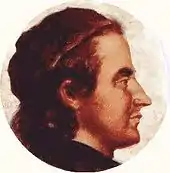
- Philipp Matthäus Hahn (1739–1790), pastor, designer and inventor, lived in Onstmettingen in 1764–1770
- Ignaz Anton Demeter (1773–1842), 1802–1808 first Parish Councilor in Lautlingen, 1836–1842 Archbishop of Freiburg.
- Otto Hahn (1879–1968), chemist, nuclear scientist, Nobel laureate. After the Kaiser Wilhelm Institute was bombed out in Berlin in the spring of 1944, he researched from June 1944 to April 1945 in Tailfingen.
- Berthold Schenk Graf von Stauffenberg (1905–1944), jurist, participant in the assassination attempt on Adolf Hitler; spent parts of his youth in Lautlingen
- Claus von Stauffenberg (1907–1944), officer, assassin on Adolf Hitler; spent parts of his youth in Lautlingen
- Martin Schaudt (born 1958), dressage rider
See also
- Kern & Sohn (1844)
References
- , Staatsanzeiger, accessed 10 August 2023.
- "Bevölkerung nach Nationalität und Geschlecht am 31. Dezember 2021" [Population by nationality and sex as of December 31, 2021] (CSV) (in German). Statistisches Landesamt Baden-Württemberg. June 2022.
- Schwarzwaelder-bote website
- British Museum Collection
- "Das Albstadt-Erdbeben 1911" (in German). Erdbebennews.de. 2019-11-04.
- "Albstadt - Kaum ein Gebäude blieb verschont" (in German). Schwarzwälder Bote. 2011-11-16.
- "Historisches Erdbeben (M5.7): 28. Mai 1943 Albstadt" (in German). Erdbebennews.de. 2021-03-15.
- "Albstadt - Blick zurück: Im Juli 1944 fielen Bomben auf Ebingen – 65 Menschen kamen ums Leben" (in German). Zollern-Alb-Kurier.de. 2019-07-11.
- "Albstadt - Heute vor 75 Jahren fielen die Bomben" (in German). Schwarzwälder Bote. 2020-02-21.
- "Das Albstadt-Erdbeben 1978" (in German). Erdbebennews.de. 2019-09-03.
- Heino Schütte (2011-03-14). "Alb-Beben 1978: Der nächste Sechser kommt bestimmt" (in German). Stuttgarter Nachrichten.
- YMCA Tailfingen
- Ortodoxe Osternacht
- TOS
- Gemeinde Gottes
- Adventisten
- University
- Sport School
- Hermann Bitzer, Hermann Bitzer Studienrat Rosenfeld †1964 (ed.), Tailfinger Heimatbuch 1954 (in German), p. 35
- Fruchtkasten: Abteilung Ludwigsthal. In: Pressemiteilungen. 21 November 2016.
- YMCA
- FIT_UP
- http://www.albstadt.de/stadt/zahlendatenfakten (in German) Population numbers
- "Städtepartnerschaft - Unsere Partnerstadt Chambery". albstadt.de (in German). Albstadt. Retrieved 2021-02-04.
External links
![]() Media related to Albstadt at Wikimedia Commons
Media related to Albstadt at Wikimedia Commons